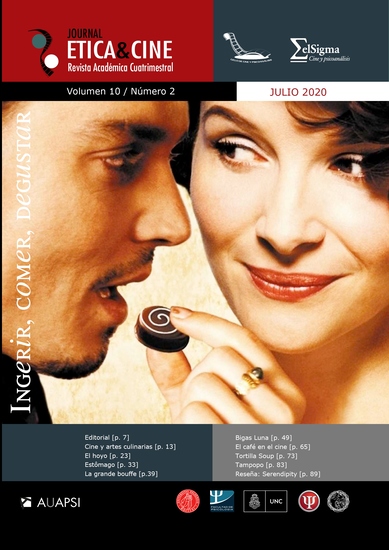Eating to live/Eating until death. Subjectivity and voracity
DOI:
https://doi.org/10.31056/2250.5415.v10.n2.29249Keywords:
Culinary art, Consumption, Gluttony, Obsession, Meaningless, SuicideAbstract
Taking as a basis of reflection La grande bouffe (The Big Feast), by Ferreri (1973), this article intends to show to what extent eating constitutes in the
contemporary world a perfect emblem of consumer society and of subjectivity itself. After it is separated from its meaning and good sense as nutritional need, eating becomes obsessive. Instead of “eating to live”, our voracity and insatiability (already essential features of the human being) seem to lead “to eat until death” or, as in the Ferreri/Azcona film, to eat-towards-death. We have become swallows and gluttons, in a delirium of excess, as an answer absurd and, at the same time, logical) to the impossibility of transcending the “ingestion” not only of food, but also of Everything. In this sense, the last of the arts should be the culinary art, which should seduce us to wish to eat when we no longer have an appetite. On the other hand, from the ethical point of view, Ferreri/Azcona invite us indirectly to think, that while some human beings are starving, we die fed up with our insatiable satiety. In this way, erreri’s film becomes a very current mirror of the contemporary world and a strange, ironic and sad, but lucid,
apology for the seductive and deadly art of cooking, which excites our voracity, if one may say so. Ten years later (1983), Creosota burst, fed up with
eating, from Monty Python’s The Meaning of Life.
References
Baudrillard, J. (1991). La transparencia del mal. Ensayo sobre los fenómenos extremos. Barcelona, España: Anagrama.
Company, J.M. (1991). El lugar de la ausencia. Ferreri desde el psicoanálisis. En E. Riambau (Ed.), Antes del apocalipsis. El cine de Marco Ferreri (pp. 93-102). Madrid, España: Cátedra.
Dauman, A. (productora) y Oshima, N. (director). (1976). El imperio de los sentidos [cinta cinematográfica]. Japón: Argos Films.
Fabris, A. (2019). Etica del mangiare. Cibo e relazione. Pisa, Italia: Edizioni ETS.
Grimaldi, A. (productor) y Bertolucci, B. (director). (1972). El último tango en París [cinta cinematográfica]. Italia: United Artists.
Grimaldi, A. (productor) y Pasolini, P.P. (director). (1975). Saló o los 120 día de Sodoma [cinta cinematográfica]. Italia: Produzioni Europee Associate; Les Productions Artistes Associés
Goldstone, J. (productor) y Jones, T. (director). (1976). El sentido de la vida [cinta cinematográfica]. EEUU: Universal Pictures.
Guarner, J.L. (1991). Cómo subvertir géneros tradicionales en cuatro lecciones (que podrían ser más) a cargo del profesor Marco Ferreri, aproximadamente transcritas por el estudiante José Luis Guarner. En E. Riambau (Ed.), Antes del apocalipsis. El cine de Marco Ferreri (pp. 59-66). Madrid, España: Cátedra.
Heidegger, M. (1988). Serenidad. Barcelona, España: Ediciones del Serbal.
Hénaff, M. (1980). Sade. La invención del cuerpo libertino. Barcelona, España: Ediciones Destino.
Kubrick, S. (productor y director). (1971). La naranja mecánica [cinta cinematográfica]. Reino Unido: Warner Bros; Hawk Films.
Lévi-Strauss, C. (1988). Tristes trópicos. Barcelona, España: Paidós.
Lipovestky, G. (1986). La era del vacío. Ensayos sobre el individualismo contemporáneo. Barcelona, España: Anagrama.
Malle, V. y Rassam, J.-P. (productores) y Ferreri, M. (director). (1973). La grande bouffe [cinta cinematográfica]. Italia/Francia: Mara Films / Les Films 66 / Capitolana Films.
Marinoff, L. (2000). Más Platón y menos Prozac: filosofía para la vida cotidiana. Barcelona: Ediciones B.
Morandini, M. (1991). El moralista apocalíptico: Ferreri en los años setenta. En E. Riambau (Ed.), Antes del apocalipsis. El cine de Marco Ferreri (pp. 49-55). Madrid, España: Cátedra.
Rabelais, F. (1992). Gargantúa. Madrid, España: Alianza Editorial.
Riambau, E. (1991). Introducción. En E. Riambau (Ed.). Antes del apocalipsis. El cine de Marco Ferreri (pp. 7-10). Madrid, España: Cátedra.
Selznick, D. (productor) y Fleming (director). (1939). Lo que el viento se llevó [cinta cinematográfica]. Estados Unidos: Metro-Goldwyn-Mayer; Selznick International Pictures.
Torreiro, C. (1991). La muerte de la máscara. El actor en el cine de Ferreri. En E. Riambau (Ed.), Antes del apocalipsis. El cine de Marco Ferreri (pp. 67-74). Madrid, España: Cátedra.
Downloads
Published
Issue
Section
License
Copyright (c) 2020 Ética y Cine

This work is licensed under a Creative Commons Attribution-ShareAlike 4.0 International License.
Los autores que publiquen en Ética y Cine Journal aceptan las siguientes condiciones:
Los autores/as conservan los derechos de autor © y permiten la publicación a Ética y Cine Journal, bajo licencia CC BY-SA / Reconocimiento - Reconocimiento-CompartirIgual 4.0 Internacional. La adopción de esta licencia permite copiar, redistribuir, comunicar públicamente la obra, reconociendo los créditos de la misma, y construir sobre el material publicado, debiendo otorgar el crédito apropiado a través de un enlace a la licencia e indicando si se realizaron cambios.

Este obra está bajo una licencia de Creative Commons Reconocimiento-CompartirIgual 4.0 Internacional.




